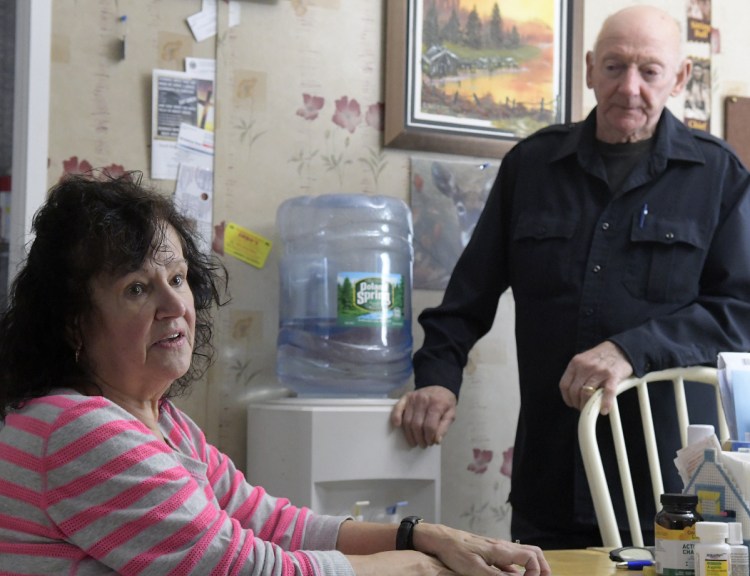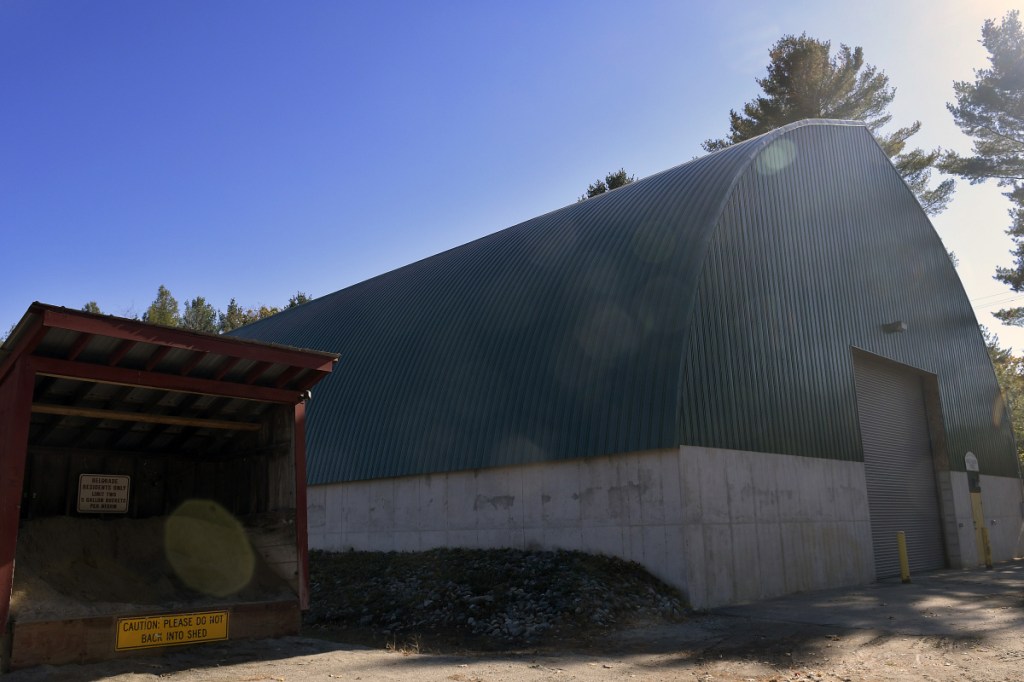BELGRADE — Four 5-gallon bottles of Poland Spring Water line one side of the kitchen in the home of Cathy and Gene Burgess.
Cathy Burgess, 73, uses it for drinking water, for the large kettles of soup she makes to give to the elderly, and for anything she’s cooking for her husband.
The tap water from their well has tested as having too much salt for safe consumption, so the state Department of Transportation is supplying water to the Burgesses and seven other affected households located in a triangular area framed by Oakland, Cemetery and Augusta roads. The water from wells there exceeds the 250 parts per million of chloride public drinking water standard when tested.
The bottled water deliveries will continue as the state and town seek a long-term solution for high levels of salt, which can be traced to leaching from municipal and state piles of road salt across Cemetery Road that went uncovered for years.
“We’re trying to figure out how far it’s extended,” Jamie Andrews, lead engineer with the state transportation department, told the Belgrade Board of Selectpersons this week.
Hydrogeologist Dwight Doughty classified the salt contamination as “a legacy issue,” which has erupted again after the salt, which had been sequestered for some years, recently started moving again. The state representatives brought a possible solution in the form of a proposal to develop a public water supply for the properties in the “Belgrade Triangle” area.
In 2011, the state and the town signed a Memorandum of Agreement to resolve well claims by property owners around Cemetery Road. That agreement said the two entities would cooperate on the solution and share in the costs, with the state picking up the tab for staff time and routine testing.
Town Manager Dennis Keschl asked for an estimate of how much money he should include in next year’s budget for the town’s share of the costs, and Andrews suggested about $70,000. That is roughly half the estimate provided by Random Consulting Inc., to locate and develop a small community public water supply well in the area.
Gene and Cathy Burgess say they’re happy with the state’s bottled water solution so far.
“He lugged water here for 30 years,” said Cathy Burgess.
Gene Burgess’s family owned the entire triangle property at one point. His father, Lloyd Burgess, ran Lloyd’s Texaco, and his mother, Helen, operated the Corner Market, which is now Christy’s Country Store.
Gene Burgess, 78, said the water turned bad in the late 1980s.
“The water smelled so bad you couldn’t stand it,” he said. “I didn’t like to be at the sink.”
So he fetched drinking water from a camp farther up the road.
Then the town signed an agreement in 2011 to deal with salt contamination, and Gene Burgess said his well became contaminated with salt and likely run-off from nearby farms.
So the state drilled a new, relatively shallow well for him three years ago, hitting good water on the third try.
“It was the best we had ever,” he said.
Now, when they turn on the tap, Gene Burgess said, they get “nasty water like we were getting before.”
Cathy Burgess has high hopes for a new water supply.
“Maybe this time we’ll get gold,” she speculated.
The high chloride content leaves a white residue on faucets, and the pots and pans she uses.
“I don’t have to put as much salt in my potatoes,” she said, when she uses the tap water. “I cook with it and I drink with it. It doesn’t bother me. They’re doing all they can and then some.”
Gene Burgess pointed to an area just below the kitchen window where an outside faucet allows for easy sampling for tests.
In 2016, town voters approved paying $157,000 for a series of cost overruns for the new Town Office, which is located in that triangle. Among those costs was $11,200 for a water filtration system for the entire building after tests showed a high level of salt in the water.
Betty Adams — 621-5631
Twitter: @betadams
Send questions/comments to the editors.





Comments are no longer available on this story